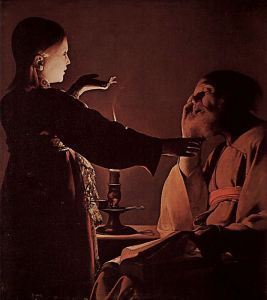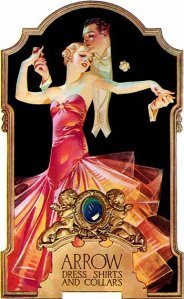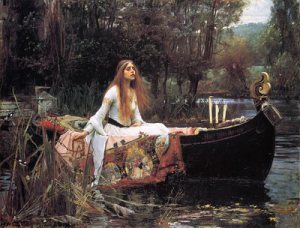Narrelle M. Harris's Blog, page 40
November 2, 2012
Genrecon: Help! My brain is full!
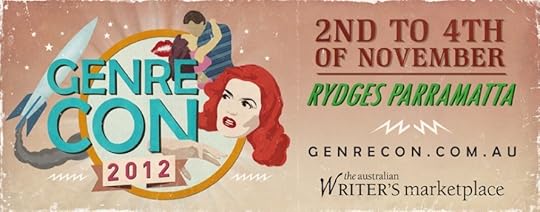 Well, it’s Saturday afternoon at Genrecon, and my brain is way too full. I need to jump up and down a bit, like packing flour into a container, to let the contents settle and make room for more. Instead, I’m taking some time out to sit quietly, drink a hot beverage and update my blog. Outside I can see cloudy skies and a gusty wind having its salacious way with the fronds of a palm tree. Ah, Parramatta, you sexy beast, you.
Well, it’s Saturday afternoon at Genrecon, and my brain is way too full. I need to jump up and down a bit, like packing flour into a container, to let the contents settle and make room for more. Instead, I’m taking some time out to sit quietly, drink a hot beverage and update my blog. Outside I can see cloudy skies and a gusty wind having its salacious way with the fronds of a palm tree. Ah, Parramatta, you sexy beast, you.
Genrecon is a conference for writers of genre fiction, and Rydges Hotel in Parramatta is full of writers of romance, crime, fantasy, SF and horror (and a lot of other genres besides). It’s also full of editors, publishers (both large and small press) and agents.
So far I’ve attended panels on Writing Effective Fight Scenes conducted by writer and martial artist Simon Higgins, how to make a living as a writer in an era of the dwindling advance, and ways of approaching Villains, Monsters and Cads in your writing. Tomorrow I’m looking forward to panels on The Future of Agenting and The Three Stages of The Writers’s Career.I’ll also be participating in a debate about how approaching plot outlines – I’ll be speaking for the Plotters against the Pantsers (‘flying by the seat of your pants’).
Things I’ve learned so far?
Historically, the deadliest ninjas were girls.
Adrenalin gives short bursts of power, but there’s a cost for it.
Even big, tough men can cry if they are unexpectedly punched in the face.
Anyone who is in writing to get rich is both hilarious and deluded. (Or JK Rowling.)
Almost all writers get income from something other than their writing. If they’re lucky, they get it through public speaking and workshops.
When creating villains, it’s a great idea to take something traditional and then approach it from a different perspective.
While the villain is the hero of his/her own story, the gothic anti-hero knows that they are the villain of their own story, and must overcome his/her own flaws.
(I think BBC Sherlock is may be a gothic antihero in this sense.)
Traditionally, female villains are either thwarted in love or trying to make their son Emporer. Surely there are other motivations out there.
Kim Wilkins feels there are not enough Vikings in literature. I find myself suddenly agreeing with her.
Other things I’ve gained, outside the panels, is that it’s wonderful to spend time swapping war stories and successes with fellow writers; that it’s encouraging and even necessary for your own motivation to hear people say they like what you do and to tell others how much you like their work too.
Writers generally work in such isolation that it’s a huge relief to talk to others about their writing habits, approaches that work (or not) for them, to see that others struggle, and others succeed, so you know you’re not alone and that success is possible.
I wasn’t sure what to expect from an industry conference for writers, but so far I’m finding it intensely stimulating, challenging, inspirational and reassuring. The Queensland Writers Centre has done a great job of organising guests, panels, workshops and an opportunity for writers to talk to agents. Bless them all!
(As an aside, I had the best street conversation ever on my walk to the venue today: some kids asked me if I’d seen a goat. Yes. A goat. Yes, I did ask twice, to check they meant ‘goat’ and not ‘coat’. Having ascertained that indeed, a goat was what they meant, I confessed that I had not seen one, but if I should, where should I direct the beast? “To the school” they said, pointing. As both a writer and as a human being, I was very disappointed not to see the goat between the school and the conference venue. I sincerely hope the horror, crime or thriller writers in attendance were not responsible for its disappearance. If the romance writers were involved, I definitely don’t want to know.)


October 15, 2012
Review: Power and Majesty by Tansy Rayner Roberts (AWW Challenge #10)
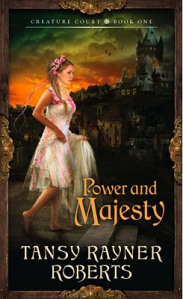 Sometimes I’m such a numpty. I see a book in my stash that’s 500 pages long and I think “I want to read that but it will take aaaaaages. It’s so biiiiiiiiiiiig.” So I put it off and off and off, until finally I think: “Damnit. I will MAKE time.”
Sometimes I’m such a numpty. I see a book in my stash that’s 500 pages long and I think “I want to read that but it will take aaaaaages. It’s so biiiiiiiiiiiig.” So I put it off and off and off, until finally I think: “Damnit. I will MAKE time.”
And then I read it over two weekends, in two massive gulps, devouring it like a starving thing, reluctant to put it down because OMG WHAT HAPPENS NEXT??!! Apparently, it’s not the size that counts, it’s the writing.
Power and Majesty is the first in a trilogy about the Creature Court – a group of people with extraordinary powers, who secretly fight a war in the night sky of the city of Aufleur. The daylight folk have no idea what’s going on each night (or ‘nox’), or the price they’ll pay if the Court loses.
At the start of the book, Velody is a 14 year old girl, come to Aufleur to seek a position as an apprentice dressmaker. On her first night in the city, she can’t sleep. Slipping away from her chaperone to the balcony of her accommodation, she witnesses a young man fall from the sky. Garnet finds her, recognises her innate magic – and with her uninformed permission, takes away her magic.
Years later, Velody is an adult, an accomplished dressmaker living and working with her two best friends, still ignorant of the Creature Court and its nightly war. That’s when a sky battle goes badly wrong and Velody’s power is suddenly restored. She and her friends are drawn into the mad, dangerous and deadly games of the Creature Court and the war that’s killing them one by one.
That’s the basic premise of a book that is rich in detail. The world Roberts creates is an imaginative, delightful mix of an alternative Italy which could be a hundred years old or closer to our own times. But don’t rely on any idea of historical fantasy or modern alternative reality – Roberts had done something much more difficult and exciting. She’s taken bolts and cuttings of a world we know and stitched an entire, fresh new world out of them. Innovative use of language and a respect for the complexities of different cultures and times make the worlds of Aufleur and the Creature Court distinct and complete, where they are separate as well as where they overlap.
The characters are wonderfully complex and so very messed up. There’s darkness and light, betrayal and redemption, loss and triumph. Often simultaneously. No matter how strange the powers they have, or the lives they lead, every human, every sentinel and every mad bastard from the Court is a multi-faceted, very real person.
A big surprise for me was how much I enjoyed the frocks. Fiction in which the female protagonist is excited about shoes and dresses rarely does much for me. I care not a whit for shoes and dresses, generally. But Velody and her friends Rhian and Delphine aren’t just clothes horses. Dress and appearance are a powerful representation of power and status as well as creativity, not to mention the fact that these skills are the livelihoods of these wonderful characters. The mindset of creation, of stitching parts together to make a more wonderful whole, is an important underlying theme, too.
Velody being a dressmaker is an integral part of who she is – and more to the point, this part of Velody is an integral part of how she deals with the challenges and horrors of the Creature Court. Others who have come to the Court as children and have known nothing but the fight against the sky and vying for power with each other seem to know nothing but destruction. Velody, protected from that world by Garnet’s theft of her magic, grew to adulthood as a carer and creator. She works with her friends to create wearable art. The difference is vital and may be what will save both the Creature Court and the city they battle to protect.
While Power and Majesty is certainly not a vampire novel – I’ve seen it described as a combination of urban fantasy and court fantasy with elements of manga and goth (and none of that does it justice) – Roberts also makes innovative use of vampire tropes. There’s a lot of sharing of vital fluids: ingestion of blood from mortals to members of the Court and vice versa not only aids healing but has other effects which are important to the plot. In the Court, Poet’s ability to become hundreds of rats echoes the same ability Dracula has in some versions of the old story, but of course this ability to become an abundance of one’s power animal is a characteristic shared by the whole Court. It’s where the name comes from, after all. Some Court members become birds, cats or wolves.
So, here we have incredibly intelligent, creative, complex and colourful world-building married to fabulous, layered characterisation and engaging, tense powerplays, social interactions and politics in all levels of society. Add to that the fact that from one chapter to the next, I just couldn’t guess where we might be going. In a lot of stories, you can get the broad gist of what is coming next. Reading Power and Majesty, I honestly never had a clue. Who can be trusted? How will Velody react to this latest challenge? What’s going to happen to Delphine? Oh my giddy lord, what have you done to the sentinels??!!
It’s delicious, it’s exquisite, it’s exhilarating, it’s pain of the purest, most pleasurable kind to have no idea how it’s all going to work out, or what’s going to happen next, or who to trust, and sometimes even who to like – and to wanted to grab the writer’s hand and run headlong down that unknown path to find out!! No wonder I read it in those two big gulps. I couldn’t bear to slow down, and the grace of the writing led me down that magnificent path at a gallop.
So, after leaving Power and Majesty unread for a year, stupidly daunted by the size of it (because, as mentioned, I’m a numpty) I immediately upon finishing downloaded the next book, The Shattered City, to start right away. And that night sat next to a complete stranger in a Melbourne theatre and told her she should read it. Because she should. You all should. It’s terrific!
Buy Power and Majesty in paperback
Get Power and Majesty
 for your Kindle
for your KindleNarrelle M Harris is a Melbourne-based writer. Find out more about her books, smartphone apps, public speaking and other activities at www.narrellemharris.com.


October 8, 2012
Reviews: Literary inspiration at the Melbourne Fringe Festival
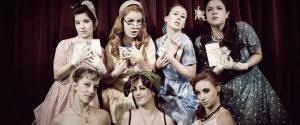
Boon-esque at the Melbourne Fringe Festival (c) Bobby and the Pins
Melbourne’s Fringe Festival is on, and as always, I love to look out for shows that are inspired by words and books.
Mark Butler brings the wordy goodness to the festival again this year. Last year’s Grammar Don’t Matter on a First Date was a delight for the word geek. This year, his Words Swallower presents his inimitable combination of clever word play and knob jokes. The mooshing together of high and low humour is much more entertaining than sometimes it should be.
Butler’s show springs from his habit, as a boy, of inventing words, which he then wrote up in his own dictionary. Some of the invented words are classics, and I’m determined to use podger and gobfart in my own lexicon in future. Special praise goes to aggreviation for being both one of the cleaner inventions and for being a much needed word, meaning ‘abbreviations that piss me off’.
A section in the middle goes into some potentially transgressive ground, positing that some diagnosed mental illnesses are self-serving ways of simply getting away with bad behaviour. I for one am not convinced that sex addiction is a mental illness so much as an excuse to exercise absolutely no self restraint – but transgression is what comedy is for.
Butler’s on firmer ground with word invention, family members who just don’t get him, crass sibling rivalry and the world of the logophile.
The rise of burlesque in recent years is bringing a wealth of new shows to the festival, too. Boon-esque does a fabulous job of combining the tropes of the romance novel with the simmering sexuality of the burlesque review.
Starting with a re-enactment of the Victorian era bodice ripper, Boon-esque showcases different kinds of romance: the medical romance, the femme fatale, eras from the 40s to the 70s. In between fabulous songs in four-part harmony and burlesque dancing, passages are read from actual romance novels, sending up the stereotypes of the kind of women who are thought to read romance too. My favourite was the snarky, ironic reading by the modern young girl.
The songs deserve a special mention for being so brilliant and lovely, as does the bridal anti-strip done to Boogie Woogie Bugle Boy. I loved the increasingly cross rendition of Mr Sandman, too, with the singers getting frustrated that Mr Sandman hasn’t yet delivered the dream.
Boon-esque is fun and clever and marries the sensuality/romance tropes of both burlesque and romance fiction superbly.
The improv show, Word/Play, didn’t really work for me. Using readings from a book by a Melbourne novelist as jump-off points for improvised scenes sounded good in theory, but I forgot how hit and miss improv can be. The absurdist flights of fancy were fun, but I found a lot of the scenes overly dramatic and lacking context. Improvisational theatre that takes fragments and makes a new, on-the-fly whole is exhilarating, but I found that taking a coherent narrative and stripping it of structure didn’t appeal. The improv team were good and worked well together, but it turns out that the theatre form just isn’t my cup of tea. If it’s yours, it’s probably worth a look.
Still, if you’re at Revolt anyway, you could take in another burlesque show, Aphrodite’s Bordello. Set in a modern version of Aphrodite’s temple, the goddess’s handmaidens are increasingly frustrated and annoyed by the lack of men coming to worship. There’s a loose story about loser-in-love Aphrodite being terribly bitter (Megan Salpietro and her powerhouse voice are amazing in the role). One by one, the handmaidens make their own arrangements to deal with the situation until the final angry fight.
There’s singing (I love the macabre Give a Little Love to the Dead People), dancing (the Fan Dance is especially wonderful) and wickedly funny little scenes aimed at subverting ideas of feminine beauty. The sequence with the world-shaking pelvic floor exercises and the household-chore inspired Doing the Martha Stewart were particularly entertaining.
So with a week to go of Fringe, if you’re into inventive rude words, romance novels or burlesque in general, these are the shows for you!
Narrelle M Harris is a Melbourne-based writer. Find out more about her books, smartphone apps, public speaking and other activities at www.narrellemharris.com.


October 4, 2012
Lessons in Language: All above board and ship shape!
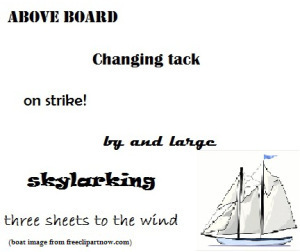 I once wrote a feisty rant about the phrase changing tack (meaning to change one’s approach) and how some folks mistakenly write that as change tact, despite the terms surely obvious nautical origins. It shouldn’t make me foam at the mouth, and yet it does. Okay. So I’m not necessarily a reasonable human being.
I once wrote a feisty rant about the phrase changing tack (meaning to change one’s approach) and how some folks mistakenly write that as change tact, despite the terms surely obvious nautical origins. It shouldn’t make me foam at the mouth, and yet it does. Okay. So I’m not necessarily a reasonable human being.
The thing is, knowing the origins of a word can tell us a lot about how to spell the word as well as its meaning. (I go on and on and on about it, I know, I know. The day I stop being passionate about etymology will probably be three weeks after I’m dead.)
Some etymology of words and phrases is steeped in mystery. I wrote about the phrase toe the line a while back to, and recently found that some people claim the phrase’s origins, like changing tack, reside in the language of seafarers. My investigations into nautical-inspired English suggest the term comes from sailors having to line up with a seam in the deck planks. Some sailors were made to stand at the line at attention as punishment, hence the meaning of toe the line meaning to accept authority and obey the rules. Having said that, I’m not yet certain that anyone has been able to definitively lay claim on the phrase.
However, the sea and sailors have clearly given English many words and phrases that are not used in an obviously oceanic sense any more. Take, for shining example, the following words and expressions.
Above board: if everything is above board, it means that everything can be clearly seen and nothing hidden or underhanded is going on. It refers to having all one’s cargo and crew visible on deck. As opposed to hiding half your crew belowdecks with their cutlasses so they can sneak up on you and board your ship once you get into jumping distance. A tactic for blackguards the Dread Pirate Roberts.
To strike; to stop work: apparently, if a lunatic captain tried to put out to sea when it was dangerous, some brave sailors might lower, or strike, the ship’s sails in order to prevent mass suicide.
Three sheets to the wind: sheets, in this case, refers to the ropes which hold sails in place, rather than the sails themselves. If at least three of these ropes fail to be fastened, the sails are all over the place and the ship will, likewise, stagger all over the sea like a drunken bogan on race day.
By and large; generally speaking: by and large actually refer to types of wind. Who knew? Well, sailors, obviously. A large wind is one that is blowing in same direction you’re trying to sail. If the wind is by, it’s… not. Okay, so I’m not a sailor, but the upshot is that a wind can be in your direction, or it can be less favourable, but with the clever use of the right kinds of sails, a ship can travel both by and large. I’m sure I had a point at the start there. Oh look. A bird.
Skylarking: that’s a good word, isn’t it? Full of verve and joie de vivre. Mucking about like a lark in the sky, and hopefully not crashing to earth, because we know it’s all fun and games until someone loses an eye. Or falls off the rigging, because the term originates in from wantonly playing about in the rigging. I like the use of ‘wantonly’ there. It has pep.
So on that note, I’m off to skylark around with the new novel, and if I fail to get traction with it, I’ll nip down to the pub, end up three sheets to the wind, go on strike from the damned thing and, by and large, wish I’d taken up knitting instead. Don’t worry. It’s all above board.
Narrelle M Harris is a Melbourne-based writer. Find out more about her books, iPhone apps, public speaking and other activities at www.narrellemharris.com.


September 17, 2012
Lessons in Language: Eponymous
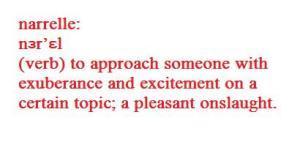 A few weeks ago, I wrote about how as a standard word in the English language, despite the inherent pitfalls in the idea.
A few weeks ago, I wrote about how as a standard word in the English language, despite the inherent pitfalls in the idea.
Several people made entertaining suggestions for what my name might mean, if the circumstances were ever right for it.
Alan Baxter suggested: To narrelle (v) – to worry existentially about the mark you leave in history. narreller (noun) She can’t stop writing because she’s such a nareller.
Seantheblogonaut said: To narrelle (v) – to approach someone with exuberance and excitement on a certain topic, a pleasant onslaught. He was narrelled into a corner, overcome by the young man’s exuberance.
George Ivanoff said: To narrelle — to make a great show of having a difference of opinion with someone, only to later discover that you actually share the same opinion. Especially in reference to Doctor Who.
I promised a copy of Walking Shadows to the entry that made me laugh the hardest, and I have to say all three of these people know me rather well! But the winner has to be Sean, because that’s pretty much a perfect way to be remembered for a slightly scary thing I do but in a nice way. 
In that last post, I also cheekily suggested that a carmody (noun) was a period of 13 years between one instalment of a book series and the next. (I hope Isobelle Carmody doesn’t mind…)
Of course, a few more ideas then came to me.
For example, I suspect that Tara Moss will have a big impact on the language. ‘Moss’ will be an adjective meaning ‘elegant and articulate’. However, the phrasal verb ‘to moss up‘ means for a writer ‘to attempt to become more elegant and articulate (perhaps by scrubbing off the worst of the ink stains), but not quite getting there’. Using both of these words in a sentence: Narrelle mossed up for the television interview but she had to face it, she would never really be moss.
Hazel Edwards is going to make her mark as well, as a noun: hazel: an entrepreneurial writer with a generous spirit. As Stefan began his career, he knew that one day he wanted to be a hazel.
On Twitter, @angryaussie and I were talking about what gaiman might be (surely Neil Gaiman will become part of the language, if he isn’t already). @angryaussie thought ‘to gaiman (v): To reimagine existing mythologies in completely new ways. (see Sandman and American Gods)’. I thought a gaiman (noun) might be a writer who successfully creates work across multiple genres (books, comics, films and tv scripts, songs and so on). I’d quite like to be a gaiman one day.
Of course, it wasn’t enough for me to get folks to define me in a future lexicon, no! I invited some other writers to suggest what their names might mean, if they entered the language. Here is what a few brave and creative people sent to me.
Trudi Canavan: to be trudied is to have whacky homebaked cookies brought to your ‘do’.
Gillian Polack: A Polack, of course, is what Hamlet’s father killed on the ice, so a gillianpolack is someone who lives in many timelines, with a deep understanding of the foodways of each but who has a secret fear of Shakespeare.
Alan Baxter: I can’t stand it when people are douches and get away with it because no one will ever call them on it. I always do. So maybe “alaning” someone could be calling out their bad behaviour or bullshit.
Rowena Cory Daniells: I would like my name to mean: rowena… One who brings Calm
Kaaren Warren: I’m hoping that to warren will mean to burrow into the subconcious leaving disquieting deposits behind.
George Ivanoff: to ivanoff — to insert a Doctor Who reference into a piece of your own writing. He’s ivanoffed twice in his new novel.
(And yes, I have ivanoffed once in Gamers’ Quest, once in Gamers’ Challenge, and thus far twice in Gamers’ Rebellion [which I’m currently writing]).
Helen Lowe: a helenlowe: just one umlaut away from a lion. (This suggestion comes via Helen’s partner, Andrew Robins)
If you want to play the game, feel free to leave a comment defining your name in the future lexicon!
Narrelle M Harris is a Melbourne-based writer. Find out more about her books, iPhone apps, public speaking and other activities at www.narrellemharris.com.


August 29, 2012
Interview: Rowena Cory Daniells
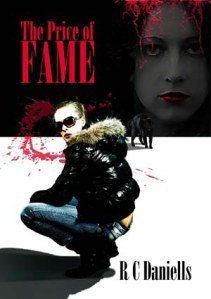 Rowena Cory Daniells’ latest book, The Price of Fame, has just been released through Clan Destine Press. Set in St Kilda in both the 1980s and the present day, it’s a paranormal crime thriller, engaging both music and painting in the unravelling of the murder mystery.
Rowena Cory Daniells’ latest book, The Price of Fame, has just been released through Clan Destine Press. Set in St Kilda in both the 1980s and the present day, it’s a paranormal crime thriller, engaging both music and painting in the unravelling of the murder mystery.
The storytelling is vivid, the characters strong and the distinctive sense of place combines with a slow-building creepiness to make The Price of Fame a compelling read. And it contains so many of my favourite things: Melbourne, mystery and rock and roll!
To celebrate the release of the book, I asked RC Daniells a few questions about the book, music and art.
Q: The Price of Fame is set in St Kilda: what relationship do you have with that town?
When I moved to Melbourne at the age of eighteen, I ended up living in St Kilda and stayed there (in several different flats) for the next twelve years. I loved Acland Street with its continental cake shops. I used to wander along the Esplanade to look at the craft markets and I used to go for early morning jogs through the Blessington Street Gardens.
Q: The Price of Fame combines crime, the paranormal and rock music. What do you think makes those three concepts go together?
Perhaps I’m weird but to me this seems perfectly normal. We lived in a grand old mansion that had been turned into flats. Below us were the members of a punk rock band who would practise all hours of the night and have noisy fights. One of our friends was a taxi driver who used to pick up street kids and try to help them. I was reading a lot of SF, fantasy and horror. It seemed only natural to combine all these elements. I wrote the early narrative thread of the novel when I was twenty-three, then added the contemporary thread more recently.
I should say here that the people in this book are invention. Like Mark Twain’s Tom Sawyer, they are an amalgamation of lots of people, fused together to drive a narrative.
Q: What music influenced the book?
Suffering through nights of trying to sleep while the band rehearsed. Someone told me they were The Boys Next Door (later known as The Birthday Party). I don’t know if they were, but I do know they were doing the whole Punk Rock thing. There was a vibrant music scene happening in Melbourne at the time. My husband Daryl was going to hotels like The Prince of Wales where bands like The Models, The Ears, Midnight Oil and Men at Work were playing. He says if you want to get a feel for what it was like, watch the movie Dogs in Space, directed by Richard Lowenstein, staring Michael Hutchence.
Q: Does music influence your writing generally?
I’ve done some surveys with writers on this topic and I’ve found about 75% of writers are music oriented. They’ll play certain songs to get them in the mood for certain books, even make up a play list to listen to. Music is powerful. It goes straight to the hind-brain and draws on our emotions so it’s not surprising authors use it to help them find the ‘zone’ when they’re writing.
The proportion of writers who are visually based is much smaller. I’m one of the visuals. I can go to the art gallery and come out feeling like I’ve reached a zen state. I dream vividly in full colour (sometimes with a sound track, sometimes with people singing in rhyme. The night zombies did a 1940s song and dance routine down the street was pretty amazing). But I’m not a writer who will make up a play list for my books.
Q: Do you have favourite music to listen to while you write, or do you prefer to write in silence?
Looks like I’ve answered this one. When I was illustrating, (I used to illustrate children’s books and I painted super-realist), I would play classical music. But when I write I don’t seek out music. If something is playing in the background with lyrics, I find the words get in the way of what I’m writing.
Q: What artists do you find most interesting/stimulating or are just your favourite?
Ahh, artists. You can hear me drawing a big breath. There are so many, I’m sure to forget a few.
There’s George de la Tour (1592, 1652), who did amazing things with light. He brings the intimacy of a life lived by candle light to us five hundred years later.
There’s Joseph Leyendecker, who was a homosexual immigrant to the US, yet he shaped the way US citizens thought of themselves and created the ‘look’ for a generation. You’ll recognise his work from the many Post covers and advertisements he did.
There’s the Pre-Raphaelites who reacted against the establishment until they became establishment. Their woman are beautiful, romantic and haunted. (I’ve blogged about them here).
There’s Maxfield Parrish with his saturated colours and idyllic settings.
I’ve blogged about Art Nouveau and Art Deco in the past because both these styles inspire me.
Sigh. Just writing about them makes me happy.
You can buy The Price of Fame in paperback or as an ebook.
See The Price of Fame book trailer.
Catch up with Rowena on her blog, Twitter or on GoodReads.
Narrelle M Harris is a Melbourne-based writer. Find out more about her books, iPhone apps, public speaking and other activities at www.narrellemharris.com.


August 23, 2012
Lessons in language: Remember my name (fame!)
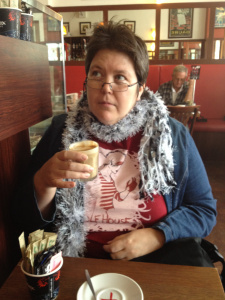
to narrelle: (verb): to dress in a slightly eccentric fashion, associated with lady novelists
Like many people, I wouldn’t mind my name being remembered by history. Who wouldn’t want to be, like Shakespeare or Herodotus, known and named centuries after their death?
But maybe not quite like other people, I’d rather like my contribution to history to be a new verb. Madeleine narrelled every Sunday. Or maybe a noun. Everybody appreciates a fine narrelle.
English vocabulary contains some terrific words that come from proper nouns. Many of these eponyms come from people’s names: sandwich, martinet, quisling, pavlova.
Even place names can become regular English words given enough time: the word doolally (meaning deranged or irrational) c0mes from the western Indian town of Deolali and dates from the 19th -20th century when British soldiers waited there before being mustered home. Between the boredom, the heat and (presumably) serious PTSD, many soldiers were hospitalised in the local sanatorium with mental health problems. Doolally isn’t used so often these days, but the word still pops up in early 20th century British fiction.
Back to people. After some research (at the superb Alpha Dictionary: Eponyms site) it seems that it’s a bit hit or miss whether people who are turned into regular nouns are actually remembered fondly.
I mean, the Earl of Sandwich might be perfectly happy to live on in the language as the inventor of the result of slapping a bit of cheese and pickle between two chunks of bread; Anna Pavlova might think it’s just fine to have her dancing career dismissed in favour of a sticky dessert made of egg whites, sugar, cream and fruit. Chances are that James Watt is perfectly thrilled to have given his name to a unit of power; and 18th Century physician Caspar Wistar might be crooning with delight that the good hearted botanist Thomas Nuttall named the wisteria vine in his honour.
I can’t help thinking, though, that Nazi collaborator Vidkun Quisling might have thought twice about his choices if he’d known his name would be adopted in the lexicon as a synonym for traitor. Notorious 16th century stickybeak Matthew Parker might have mended his ways if he’d known that ‘nosy parker’ entered the language just because of him.
There are other less-than-flattering contributions individuals have made to the language. US politician Elbridge Gerry gave us ‘gerrymander’, which is a dodgy way to draw up voting boundaries; sharp-tempered Jean Martinet gave us the name for a rigid disciplinarian.
So, it appears than unless I invent something cool (like a biro or a hansom cab) or discover an animal or a plant (like a guppy or a zinnia) or invent a delicious and convenient foodstuff (or make a friend who’ll name an invention, discovery or foodstuff after me) the chances of my name going down in history are pretty low. Unless I behave in a memorably appalling fashion, and then I can join Parker, Quisling and Gerry in the ranks of the linguistically vilified.
I’m not sure what narrelle would mean in a general lexicon anyway. A propensity to talk about vampires a lot? That writer really narrelles; doesn’t she read anything about living people? A measurement of the period between one book of a series and its sequel? It was a good narrelle between the fourth and fifth installments of the series. (Though that would surely be a carmody, measuring 13 years.)
What do you think, gentle readers? If narrelle were to enter the English language, what would it mean?
There’s a copy of Walking Shadows in it for the entry that makes me laugh the hardest. Entries close on Saturday 8 September 2012! Just write your answer in the comments.
Narrelle M Harris is a Melbourne-based writer. Find out more about her books, iPhone apps, public speaking and other activities at www.narrellemharris.com.


August 17, 2012
Review: Sharp Shooter by Marianne Delacourt (AWW Challenge #9)
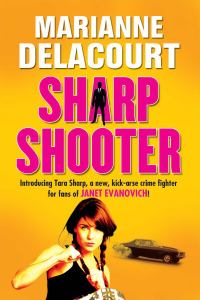 I do enjoy a bit of a crime romp, with a sassy but imperfect heroine and a supporting case of intriguing and maybe disreputable characters. Marianne Delacourt’s Sharp Shooter delivers on both counts, with the bonus of being set in an Australian city. Delacourt’s Perth is a step to the left of the real Perth, but there’s plenty that’s recognisable about my old stomping grounds.
I do enjoy a bit of a crime romp, with a sassy but imperfect heroine and a supporting case of intriguing and maybe disreputable characters. Marianne Delacourt’s Sharp Shooter delivers on both counts, with the bonus of being set in an Australian city. Delacourt’s Perth is a step to the left of the real Perth, but there’s plenty that’s recognisable about my old stomping grounds.
Tara Sharp, former basketballer and aura-reader, seems to be failing spectacularly at life, but getting a little guidance from one Mr Hara sets her on a new path. Trying to use her aura-reading skills to establish herself as a professional body-language interpreter, Tara ends up on the wrong side of a notorious criminal, his notoriously dangerous lawyer and a number of notorious-to-demented people, one or more of whom seem to want her dead.
At the same time, Tara is negotiating her attraction to a man she’s meant to be spying on, the demands of her friends and parents and, well, trying to be a proper grown up. The way to keep out of trouble is to keep her head down and her mouth shut. That gets a bit hard when, first up, you’re not a woman who knows how to shut up and, secondly, when someone, as a favour, has painted your Monaro burnt orange with racing flame insignia.
It’s all as hectic and occasionally ludicrous as you can imagine from that premise. It’s also immense fun. There’s action, awkward situations, unresolved sexual tension, unlikely friends, running like the clappers and a general sense of whirlwind adventure, with just a whisper of the paranormal. A rollicking good read!
Narrelle M Harris is a Melbourne-based writer. Find out more about her books, iPhone apps, public speaking and other activities at www.narrellemharris.com.


August 1, 2012
Review: Triangle by MKA Theatre
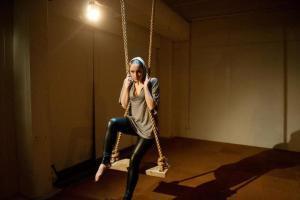
Elizabeth Nabben in Triangle; picture by Sarah Walker. Photo courtesy MKA Theatre.
You all know me by now. If there’s a whiff of the vampire around a bit of theatre, I’m knocking enthusiastically on the door yelling “Let the right one in!” demanding, like any good vampire, an invitation to the revelry.
MKA Theatre’s new production, Triangle, came to my attention with words that sounded something like ‘it’s a play about a vampire who lives in a tree in Edinburgh Gardens.’ How, I ask you, could I possible resist?
Triangle is certainly not a traditional vampire story, but it carries all the hallmarks of the genre: temptation, passion, ennui, blood, transformation and death.
It’s also witty, engaging and utterly riveting.
The vampire (Elizabeth Nabben) appears on a large wooden swing, representing her tree in Edinbugh Gardens. These ideas are a great symbol to be getting on with: freedom, playfulness, nature and the outdoors aren’t necessarily what we’d associate with the undead, but this vamp isn’t quite what you expect either. She is enthusiastically focused on the best-worst supermarket in the world, Piedemonte’s in North Fitzroy, where she gets the couscous she likes to eat and sometimes sees Chopper or Vince Colossimo pretending to shop. There’s a dangerous undercurrent to her, though, and a definite sense of the macabre. It’s no surprise that couscous is not the only thing she likes to eat.
The vampire’s strange, cool-blooded freedom contrasts sharply with the comfortable, cosy, claustrophobic life of the mother (Janine Watson) who is clearly being driven to destructive extremes by the banality of her bourgeois life in the inner city, with her son (whom she mostly refers to, disassociatively, as ‘the child’) and her despised, inattentive husband. She doses the kid up on caffeine and scorns her husband for thinking little Finnegan simply suffers from ADD. She plans to leave, to take action, but never seems to actually do anything.
And then she takes the enormous pram to the Gardens, can’t stop crying, and meets a hungry woman…
Their world gets a bit stranger after that as the story splits into multiple lines. The characters in each storyline are slightly different, their paths vary a little, and then a lot, and one path leads to giving in to an ordinary life while the other… doesn’t.
Glyn Roberts’ script is full of energy and wit, especially when humour springing from the ordinary and banal collides with scenes of raw carnage. The living are muted and half dead while the dead are vibrantly alive.
Eugyeene Teh’s fabulously simple set is excellently employed by director Tanya Dickson. Nabben and Watson display terrific physicality as well, orbiting each other around the spare stage. Their movements – languid, sharp, mirrored or disconnected - are never overdone, but never wasted.
The production leaves me with thoughts about the way a life that’s affluent but dull can contrast starkly with the violent but undoubtedly fully alive choice to embrace dramatic change. The mother at one stage cries out that at last she’s doing something, and even if what she’s doing at the time is a terrible thing, that sense of finally acting, actively choosing the path of her life instead of bumping along full of rage and resentment, makes her a much more appealing person.
I’m sure I’d have other insights into this terrific, gruesomely horrific-wonderful play in a few days time, but you need to rush along to North Melbourne to see it before then. You really do.
Triangle plays until 4 August 2012 at MKA’s pop-up theatre at 64 Sutton St, North Melbourne. Performance starts at 8pm.
Tickets: $25 full; $20 concession, at the door or online. It’s very popular, though, so buying beforehand is wise. Visit MKA to book.
Narrelle M Harris is a Melbourne-based writer. Find out more about her books, iPhone apps, public speaking and other activities at www.narrellemharris.com.


July 27, 2012
Review: Gamers’ Challenge by George Ivanoff
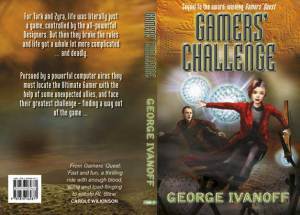 I reviewed the first of George Ivanoff’s YA adventure series, Gamers’ Quest, on my old blog, and said how much I enjoyed it.
I reviewed the first of George Ivanoff’s YA adventure series, Gamers’ Quest, on my old blog, and said how much I enjoyed it.
I was delighted, then, that this fast-paced fresh book had a sequel – Gamers’ Challenge – and even moreso to find out that George is in the throes of writing a third book in the series.
Gamers’ Challenge follows not long after the end of Gamers’ Quest where two games characters, Tark and Zyra, have defied the game designers, broken their programming with a kiss and chosen to live outside the rules of the game.
Of course, breaking the rules has consequences. They are no longer perennial teens who find game-play convenient tools and challenges as part of the game they once played: they need to sleep now, their hair grows and they get acne, for a start.
A more serious consequence is that balls of static energy now appear to be trying to kill them too.
Tark and Zyra finally meet with other people who have broken their programs and become ‘Outers’. They also learn that there are ‘cheats’, prophecies about escaping into the real world.
Gamers’ Challenge builds logically on the original world, where the characters inhabit a gaming environment full of strange magic, technomagic and technology. We find out more about Tark and Zyra’s environment, and the other gaming environments around them. There are new friendships (and not so friendly relationships) and mysteries to explore, but there’s also plenty of action and tension.
The characters are engaging and are certainly more than the simple gaming characters they were designed to be. Brave, loyal and flawed, Tark, Zyra, Hope and the others keep you caring about their fates and the fate of their world. Even the Ultimate Gamer and the Outers, though less the point of focus, have more going on that initially meets the eye.
George Ivanoff continues to write fun, fast-paced adventures for younger readers. The Gamers series might particularly appeal to boys, and the original book was listed on both the Victorian Premier’s Reading Challenge and the NSW Premier’s Reading Challenge.
Buy Gamers Challenge from Ford Street Publishers
Buy Gamers’ Quest (and other excellent Ford Street titles) (including F2M)
Read more about the Gamers series
Narrelle M Harris is a Melbourne-based writer. Find out more about her books, iPhone apps, public speaking and other activities at www.narrellemharris.com.



